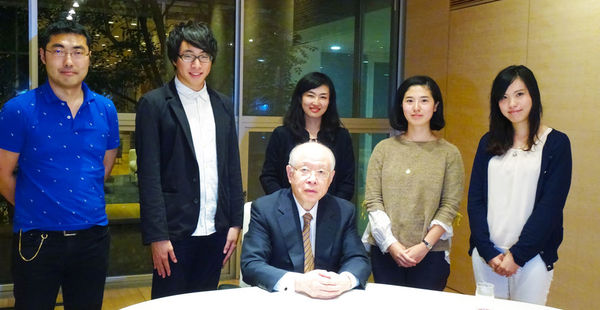Since January 2013, University Prof. Ryoji Noyori, a Nobel Laureate in Chemistry (2001), has contributed numerous articles to "Kamitsubute" in Chunichi Shimbun. Based on these articles, he holds regular academic discussions with students at Nagoya University. At the Seventeenth Noyori Academy Salon, held on October 1, 2015, Prof. Noyori and four students from different academic fields at Nagoya University discussed the topic "English Ability for Scientists." In "Kamitsubute," Prof. Noyori emphasized the importance of English in science; on the other hand, he indicated that fluent English alone should not be used as a tool to assess scientists' work. Suggesting that students should build international bonds without fear, at the salon, he stated his belief that communication ability could be enhanced by conveying words on the basis of logical thought as well as fluent English.

Manami Kobayashi, a first-year student at the Graduate School of International Development
What is missing in the Japanese people’s English communication ability?
Prof. Noyori
It may be our cultural practice; for example, even some professionals, those working in fields related to foreign affairs, do not possess perfect communication ability in English, which means that logicality is missing in most cases, even if communication happens in Japanese. The important thing is to correctly and logically discipline one’s communication ability. Researchers are required to train themselves by writing articles in English; furthermore, they should be educated in how to logically convey what they intend to the other person. As soon as students enter university, this is the first thing to be done.
Masumi Adachi, a junior at the School of Engineering
What can we learn from English education in Japan?
Prof. Noyori
Nowadays, if your work strongly relates to foreign countries but you cannot communicate in English, you will be unable to accomplish your goals. Of the global population of 7 billion, Japan comprises only 130 million, and it is clear that we must learn the English language, as the most commonly spoken language worldwide, to survive in this world.
However, I do not agree with the idea of English being an official language of Japan. If you study English, you should simultaneously study both English and Japanese. In doing so, you can learn logicality in using languages as well as protecting our spirit and that of the Japanese language.
Yui Harada, a first-year student at the Graduate School of International Development
What are advantages of English for scholars in their specialized fields?
Prof. Noyori
In science and technology, 95% of our knowledge has been written in English. Even most Asian countries are now providing science education in English. In this situation, translation can be only time-consuming.
In Japan, predecessors created the original scientific names sanso for oxygen, chisso for nitrogen, and so on, whereas new scientific words in the life sciences are mostly katakana-words recently. Further, it may even be impossible to look them up in English Japanese dictionary. Rather than using katakana-words, the use of alphabets is still better. I am worried about the state of Japanese people’s ability to understand science in 10–20 years’ time.
Nobue Kawai, a senior at the School of Medicine
In the field of nursing, English education is not being developed as much as in other subjects.
Prof. Noyori
Medical fields are governed by national legislation; therefore, they may be too restricted to be accessed from overseas. However, “open science” has become a trend nowadays for acquiring varied knowledge and ideas, necessarily requiring openness to different languages.
I feel that our cultural bond with foreign countries is weakening. For example, young people in South-East Asia are now expecting to form a partnership with China; on the other hand, Japanese students are not, and they are not even trying to study Chinese—I am worried about such a situation.
Original article published in Chunichi Shimbun on October 2, 2015.